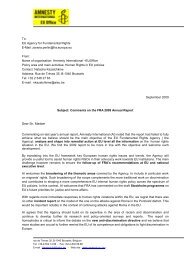Time for eULeX To prioriTize war crimes - Amnesty International ...
Time for eULeX To prioriTize war crimes - Amnesty International ...
Time for eULeX To prioriTize war crimes - Amnesty International ...
You also want an ePaper? Increase the reach of your titles
YUMPU automatically turns print PDFs into web optimized ePapers that Google loves.
56<br />
Kosovo: <strong>Time</strong> <strong>for</strong> EULEX to prioritize <strong>war</strong> <strong>crimes</strong><br />
chief prosecutor was praised in street graffiti.<br />
In interviews with EULEX officials conducted in October 2011, <strong>Amnesty</strong> <strong>International</strong> found<br />
that, whilst none was prepared to go on the record, several EULEX officials – as well as local<br />
prosecutors and judges commented on continued political interference by EULEX in<br />
particular cases or in policy areas, including a resistance to prosecute in both the Sabit Geci<br />
case, and interference by other international actors in the Fatmir Limaj case. Several credible<br />
independent interlocutors have suggested that the US Office in Kosovo had suggested to<br />
EULEX that measures should be taken to avoid the prosecution of Fatmir Limaj. It is to<br />
EULEX’s credit that they resisted such pressure, and proceedings were concluded in the<br />
<strong>for</strong>mer case, and are now ongoing in the latter.<br />
INTERFERENCE AND IMPUNITY<br />
Following publication of the Marty Report and subsequent revelations in the media, there is<br />
now incontrovertible evidence to suggest that active measures were taken by UNMIK,<br />
including by the SRSG and the Department of Justice, to ensure that investigations were not<br />
conducted, including into <strong>crimes</strong> under international law (including abductions as <strong>crimes</strong><br />
against humanity). These include allegations against <strong>for</strong>mer members of the KLA, including<br />
those occupying positions of high office. Interference was not confined to the Kosovo courts:<br />
in March 2006, the UMNIK Office of Legal Affairs sought to interfere in the issuance of<br />
international arrest <strong>war</strong>rants by Serbia on the basis that Serbia had no jurisdiction over<br />
Kosovo. 162 Interference in certain cases by the US office was also reported, including in the<br />
case of the then prime minister, Ramush Haradinaj, indicted by the Tribunal.<br />
<strong>Amnesty</strong> <strong>International</strong> has also been in<strong>for</strong>med in interviews with <strong>for</strong>mer UNMIK officials, that<br />
a number of case files were deliberately “lost” by UNMIK in the handover of cases to the<br />
EUPT and EULEX. In others cases involving the KLA, investigations were stopped: in 2003,<br />
<strong>for</strong> example, the son of a Serbian woman, abducted and killed – allegedly by the KLA –<br />
received a telephone call from the investigating police officer, to in<strong>for</strong>m him that he could no<br />
longer work on the case. No further reason was given.<br />
In the aftermath of the Marty report, an internal document from the Tribunal, dated 30 October 2003, was<br />
made available in the media; according to France 24, this document had “never been presented to the<br />
European Union’s police and justice mission in Kosovo (EULEX)”. 163<br />
The document noted that, in a meeting on 29 October 2003, the Head of the UNMIK Department of Justice had<br />
provided the Tribunal’s Chief of Investigations with “relevant material” relating to what is described as “The<br />
Albanian Issue”. This included 29 pages of documentation related to the allegations that have since been<br />
made public in the Marty report; this also includes a possibly subsequent letter, dated 12 December 2003,<br />
signed by Paul E Coffey, then Director of the UNMIK Department of Justice.<br />
The bundle of documents included interviews with four witnesses, who stated that they were participants in<br />
the transport of prisoners to Albania (as described in the Marty report) and a list of four other potential<br />
witnesses. The names of 10 “captives”, and in<strong>for</strong>mation relating to where and when they were last seen by the<br />
witnesses, are also included. As of 24 February 2012, six of those named as “captives” – Vlastimir Stovanović,<br />
Zlatko Antić, Simisa Vitosević, Gradimir Majmarević, Mladen Vasci and Sladjana Fan - remain listed as<br />
missing persons on the ICRC database. 164<br />
<strong>Amnesty</strong> <strong>International</strong> April 2012 Index: EUR 70/004/2012



